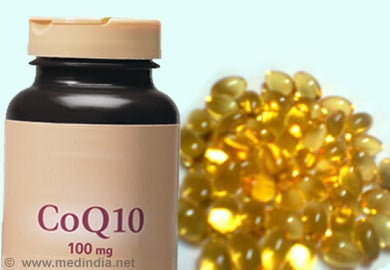- Coenzyme Q10 - Energy for Life, Jack Challem, The Nutrition Reporter™
- Hertz N, Lister RE. Improved survival in patients with end-stage cancer treated with coenzyme Q10 and other antioxidants: a pilot study. Journal of International Medical Research, 2009;37:1961-1971
- Lockwood K, Moesgaard S, Yamamoto T, et al. Progress on therapy of breast cancer with vitamin Q10 and the regression of metastases. Biochemical and Biophysical Research Communications, 1995;212:172-177.
- Cooke M, Iosia M, Buford T, et al. Effects of acute and 14-day coenzyme Q10 supplementation on exercise performance in both trained and untrained individuals. J Int Soc Sports Nutr, 2008;5:8.
- Langsjoen PH, Langsjoen JO, Langsjoen AM, Lucas LA. Treatment of statin adverse effects with supplemental coenzyme Q10 and statin drug discontinuation. BioFactors, 2005;25:147-152.
- Shults CW, Oakes D, Kieburtz K, et al. Effects of coenzyme Q10 in early Parkinson disease. Evidence of slowing of the functional decline. Archives of Neurology, 2002;59;1541-1550.
- Langsjoen PH, Langsjoen AM. The clinical use of HMG CoA-reductase inhibitors and the associated depletion of coenzyme Q10. A review of animal and human publications. BioFactors, 2003;18:101-111.
- Langsjoen PH, Langsjoen AM. The clinical use of HMG CoA-reductase inhibitors and the associated depletion of coenzyme Q10. A review of animal and human publications. BioFactors, 2003;18:101-111.
- E Baggio, R. Gandini et al., "Itamian multi-centre study on the safety and efficacy of coenzyme Q10as adjunctive therapy in heart failure," Molecular Aspects of Medicine, 15 (1994), 287-294
- Xtend Life Nutrition Supplements, Newzeland
About
There are certain components that have vitamin like characteristics but do not meet the criteria to qualify as vitamins. These quasivitamins include those that can be biosynthesized but may also be beneficial as supplements. One such life-changing compound is the “coenzyme Q10” or “ubiquinone”. Discovered in 1957, CoQ10 has far-reaching effects on health! CoQ10 helps generate energy for the cells, tissues and organs to function at their optimum level. Energy is called the “currency of life,” and the implications are profound when we know that every one of the body’s cells depends on CoQ10 for energy production. Secondary to its role in energy production, CoQ10 also functions a potent antioxidant.

Energy is generated in tiny cylindrical molecules called the “mitochondria”. In the mitochondria the most basic food molecules are broken down and converted to the pure chemical form of energy, known as ATP (adenosine triphosphate). CoQ10 or ubiquinone in the mitochondria shuttles the energy-carrying electrons in the electron transport chain leading to ATP production. Without CoQ10, ATP cannot be produced. And when CoQ10 levels are low the total energy levels reduce. The most active tissues—muscles, including the heart, brain, and liver—contain the most number of mitochondria and have the greatest CoQ10 requirements.
In addition, the redox properties of CoQ10 enable it to function as a fat soluble antioxidant much like vitamin E. High concentrations of this compound is maintained in the tissues by biosynthesis from its precursors.
CoQ10 is a natural substance and is present in every cell of the body. It is the key nutrient to help prevent any kind of degenerative condition and fatigue. Nevertheless due to certain reasons there is a reduced synthesis of this very important antioxidant and energy producer. This is the most important aspect to be understood. The reasons could be as follows:
Age
With age the body fails to make sufficient amounts of CoQ10 as depicted in the diagram below.

In conditions of Cardiomyopathy and Congestive Heart Failure
Numerous clinical studies have tested the results of CoQ10 in cardiomyopathy and congestive heart failure. Deficient levels of CoQ10 have been seen in the blood levels of patients with congestive heart failure and cardiomyopathy.
When the heart muscle is weakened due to heart ailments it places an increased demand for energy generation. The heart muscle eventually gets depleted of CoQ10 which is the most important compound needed to generate energy.
Statins
Statin drugs are widely used to lower cholesterol in today’s time. The mechanism with which the statins use to block the manufacture of cholesterol by the liver cells follows the same pathway as that of CoQ10 synthesis. The drugs block an enzyme involved in making cholesterol and CoQ10. Therefore statins inhibit the body’s natural production of CoQ10.
According to research microscopic muscle damage begins occurring within days of taking the drugs. In many people, the muscle damage is serious enough to cause muscle pain and muscle breakdown.
CoQ10 supplementation can in turn protect against the devastating side effects.
In an intervention by Dr. Langsjoen, statin drugs were replaced by CoQ10 supplements, with an average dose of 240 mg daily. After almost two years of follow up, a significant reduction in statin related symptoms (fatigue, muscle weakness, numbness) was noted along with either stable or improved heart function.








